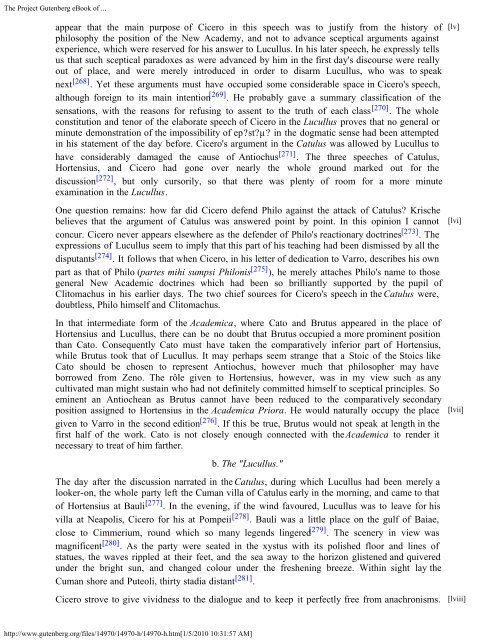academica of cicero. - 912 Freedom Library
academica of cicero. - 912 Freedom Library
academica of cicero. - 912 Freedom Library
Create successful ePaper yourself
Turn your PDF publications into a flip-book with our unique Google optimized e-Paper software.
The Project Gutenberg eBook <strong>of</strong> ...<br />
appear that the main purpose <strong>of</strong> Cicero in this speech was to justify from the history <strong>of</strong><br />
philosophy the position <strong>of</strong> the New Academy, and not to advance sceptical arguments against<br />
experience, which were reserved for his answer to Lucullus. In his later speech, he expressly tells<br />
us that such sceptical paradoxes as were advanced by him in the first day's discourse were really<br />
out <strong>of</strong> place, and were merely introduced in order to disarm Lucullus, who was to speak<br />
next [268] . Yet these arguments must have occupied some considerable space in Cicero's speech,<br />
although foreign to its main intention [269] . He probably gave a summary classification <strong>of</strong> the<br />
sensations, with the reasons for refusing to assent to the truth <strong>of</strong> each class [270] . The whole<br />
constitution and tenor <strong>of</strong> the elaborate speech <strong>of</strong> Cicero in the Lucullus proves that no general or<br />
minute demonstration <strong>of</strong> the impossibility <strong>of</strong> ep?st?µ? in the dogmatic sense had been attempted<br />
in his statement <strong>of</strong> the day before. Cicero's argument in the Catulus was allowed by Lucullus to<br />
have considerably damaged the cause <strong>of</strong> Antiochus [271] . The three speeches <strong>of</strong> Catulus,<br />
Hortensius, and Cicero had gone over nearly the whole ground marked out for the<br />
discussion [272] , but only cursorily, so that there was plenty <strong>of</strong> room for a more minute<br />
examination in the Lucullus.<br />
One question remains: how far did Cicero defend Philo against the attack <strong>of</strong> Catulus? Krische<br />
believes that the argument <strong>of</strong> Catulus was answered point by point. In this opinion I cannot<br />
concur. Cicero never appears elsewhere as the defender <strong>of</strong> Philo's reactionary doctrines [273] . The<br />
expressions <strong>of</strong> Lucullus seem to imply that this part <strong>of</strong> his teaching had been dismissed by all the<br />
disputants [274] . It follows that when Cicero, in his letter <strong>of</strong> dedication to Varro, describes his own<br />
part as that <strong>of</strong> Philo (partes mihi sumpsi Philonis [275] ), he merely attaches Philo's name to those<br />
general New Academic doctrines which had been so brilliantly supported by the pupil <strong>of</strong><br />
Clitomachus in his earlier days. The two chief sources for Cicero's speech in the Catulus were,<br />
doubtless, Philo himself and Clitomachus.<br />
In that intermediate form <strong>of</strong> the Academica, where Cato and Brutus appeared in the place <strong>of</strong><br />
Hortensius and Lucullus, there can be no doubt that Brutus occupied a more prominent position<br />
than Cato. Consequently Cato must have taken the comparatively inferior part <strong>of</strong> Hortensius,<br />
while Brutus took that <strong>of</strong> Lucullus. It may perhaps seem strange that a Stoic <strong>of</strong> the Stoics like<br />
Cato should be chosen to represent Antiochus, however much that philosopher may have<br />
borrowed from Zeno. The rôle given to Hortensius, however, was in my view such as any<br />
cultivated man might sustain who had not definitely committed himself to sceptical principles. So<br />
eminent an Antiochean as Brutus cannot have been reduced to the comparatively secondary<br />
position assigned to Hortensius in the Academica Priora. He would naturally occupy the place<br />
given to Varro in the second edition [276] . If this be true, Brutus would not speak at length in the<br />
first half <strong>of</strong> the work. Cato is not closely enough connected with the Academica to render it<br />
necessary to treat <strong>of</strong> him farther.<br />
b. The "Lucullus."<br />
The day after the discussion narrated in the Catulus, during which Lucullus had been merely a<br />
looker-on, the whole party left the Cuman villa <strong>of</strong> Catulus early in the morning, and came to that<br />
<strong>of</strong> Hortensius at Bauli [277] . In the evening, if the wind favoured, Lucullus was to leave for his<br />
villa at Neapolis, Cicero for his at Pompeii [278] . Bauli was a little place on the gulf <strong>of</strong> Baiae,<br />
close to Cimmerium, round which so many legends lingered [279] . The scenery in view was<br />
magnificent [280] . As the party were seated in the xystus with its polished floor and lines <strong>of</strong><br />
statues, the waves rippled at their feet, and the sea away to the horizon glistened and quivered<br />
under the bright sun, and changed colour under the freshening breeze. Within sight lay the<br />
Cuman shore and Puteoli, thirty stadia distant [281] .<br />
Cicero strove to give vividness to the dialogue and to keep it perfectly free from anachronisms.<br />
http://www.gutenberg.org/files/14970/14970-h/14970-h.htm[1/5/2010 10:31:57 AM]<br />
[lv]<br />
[lvi]<br />
[lvii]<br />
[lviii]















